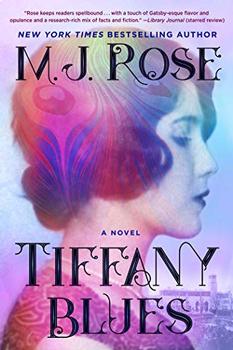Summary | Excerpt | Reading Guide | Reviews | Beyond the Book | Readalikes | Genres & Themes | Author Bio

A Novel
by M.J. Rose
Minx rolled her eyes at me, and as she returned to her own canvas, she picked a sprig of holly and tucked it behind her ear. In the sun, the leaves gleamed like jade.
Even there in the park in painting clothes, Minx was distracting. She never walked into a room without eyes turning. Everything about her gleamed, from her bobbed helmet of blond hair to her couture clothes in the palest shades of beige, pink, champagne, topaz, and citrine.
Like Minx, my hair was bobbed. But unlike hers, mine never agreed to lie flat and exploded in a profusion of curls that fell over my forehead. It made me look bohemian and mussed, whereas her smooth helmet of gold made her look chic and coiffed.
When Minx moved, the silks and satins glowed like liquid candlelight. Her deep brown-red lipstick blazed. Even her perfume shimmered: Ombré Rose from the House of L'Etoile in France. It contained minuscule flecks of gold, and sometimes you'd catch a glimmer where she'd applied the spicy, rich scent.
Despite all her dressing up and embellishments, I always saw the frantic light behind Minx's electric green eyes, her longing for something she couldn't name and didn't know how to satisfy. Gifted as both painter and sculptor, she was trying to find that something in art. And when she wasn't in the studio, she was trying to find it in too many glasses of champagne or in bed with men she never knew well enough. Like so many of our generation, even if we hadn't been at the front, we were shell-shocked in the aftermath of the war, and someone like Minx tried to chase away the sadness and loss with whatever it took—drink, drugs, frivolous theater, literature, music, forced gaiety, or a lot of sex.
After another half hour, I glanced over at Minx's canvas. She'd captured the charm and romance of the glen perfectly. We were in a section of the park called the Rambles, a particularly lush area that Frederick Law Olmsted had created to resemble natural woods. After the waterfall rushed over the rocks, it spilled into a pond surrounded by bushes and trees in configurations that didn't look man-made but indeed were.
During the three-hour period we were in the park, Professor Pannell strolled among us, examining our work, critiquing in his notoriously staccato sentences, and gesturing ferociously with his arms. He always carried his own paintbrush, which he often dipped into our palettes—without apology—to correct mistakes on our canvases.
He approached Minx and studied her work in progress.
"Lazy, lazy. You can do better. You are better. But this—" He broke off and threw up his arms.
He was tougher on her than the rest of us because—as he often repeated—she had more promise than most. And he made sure he said it loudly so we could all hear him. He believed in playing us against one another, a habit that didn't endear him to many students. Yet he was one of the most popular teachers at the League, because once you got over the shock of his methods, you could learn so much from the brushstrokes he applied to your canvas.
"More depth, Miss Deering," he said, as he dabbed his brush into the white oil paint and, with just two or three strokes, created the illusion of deeper space on the two-dimensional surface of her painting.
Leaving Minx, he stopped beside Edward Wren. Though not tall, Edward vibrated with energy. He had chestnut hair, a high forehead, and hooded hazel eyes. He had been at the League longer than Minx or I had. And while he'd taken several classes with Minx before, this was the first time the three of us were in a class together. As of late, I'd noticed Edward and Minx exchanging glances, and at home she mentioned him often. This surprised me. With his working-class aspect, Edward had neither the grace of the high-society gentlemen Minx had grown up with nor the aesthetic of the bohemian artists we spent time with. Yes, many were rebels devoted to their art, but few had scars on their cheeks or knuckles. Yet Edward did. At thirty-one, he was older and gruffer and not as polite as the other men in our set. At times, he could seem aloof or distant, as if something were preying on his mind. I knew virtually nothing about him except what I saw in his paintings—a powerful and raw talent often ruined by his impatience to invest the necessary time in finishing them. Even so, his canvases always exuded an exciting crudeness that made everyone take notice. Perhaps that rawness was why he reminded me of boys I had grown up with in Hamilton, Ontario. The sons of steel-factory workers and railroad men. The boys my mother had taught, hoping she might discover a budding artist in their midst.
Excerpted from Tiffany Blues by M.J. Rose. Copyright © 2018 by M.J. Rose. Excerpted by permission of Atria Books. All rights reserved. No part of this excerpt may be reproduced or reprinted without permission in writing from the publisher.
Your guide toexceptional books
BookBrowse seeks out and recommends the best in contemporary fiction and nonfiction—books that not only engage and entertain but also deepen our understanding of ourselves and the world around us.